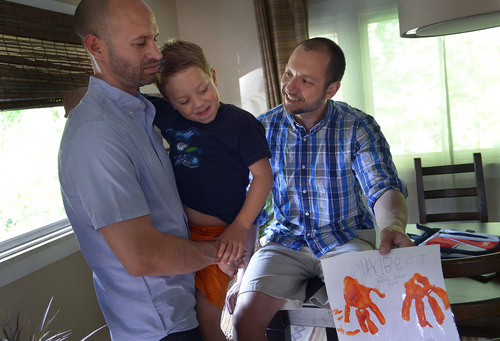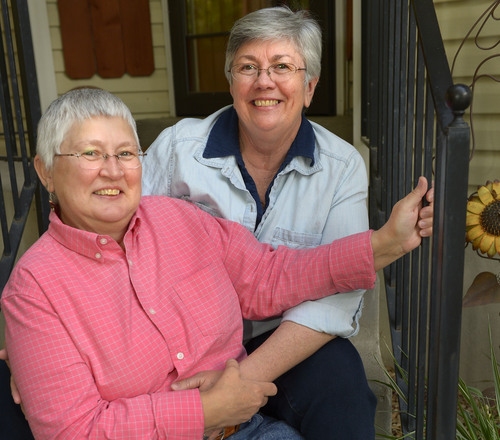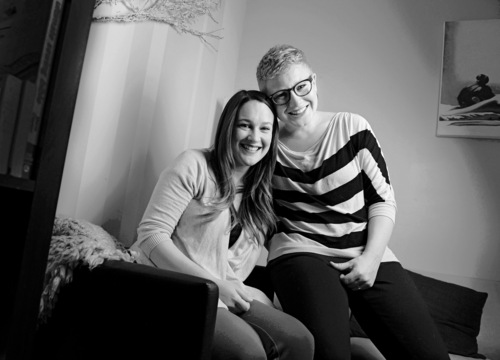This is an archived article that was published on sltrib.com in 2014, and information in the article may be outdated. It is provided only for personal research purposes and may not be reprinted.
Utah began to break down the barriers keeping same-sex spouses from receiving full marital benefits this week after the U.S. Supreme Court effectively legalized gay and lesbian unions in the Beehive State and 10 others in one fell swoop.
In Utah, that's meant backtracking and withdrawing from legal battles that have been underway for months.
"There is no longer any need for clarification about what the status of these marriages is," Utah Solicitor General Bridget Romano told The Salt Lake Tribune. "We're going to go ahead and comply with the law."
The attorney general's office asked the 10th Circuit Court of Appeals on Tuesday to drop its challenge to a federal judge's ruling that ordered Utah to imbue same-sex marriages with all the rights and protections afforded to their opposite-sex counterparts. The office also asked the Utah Supreme Court to lift its hold of four pending adoptions of children to same-sex parents.
The adoptions had been contested by the state on the premise that officials did not know whether they could grant adoptions to married same-sex couples while those marriages were in so-called legal limbo.
They will proceed once the Utah Supreme Court removes a stay put in place in May to allow the court to determine whether the adoptions — and by extension the marriages — were legal while Utah continued to defend its voter-approved ban on such unions in federal court.
"We're asking them to dismiss those cases and allow these couples to move forward and become legally recognized families," Romano said. "But the court hasn't yet lifted the stay."
It was not immediately clear when the Utah Supreme Court might act, but court spokeswoman Nancy Volmer said as of Tuesday afternoon, the justices had received the state's motion and would act "as soon as they can."
Four same-sex couples who married in the 17 days when such unions were legal following U.S. District Judge Robert J. Shelby's historic ruling had filed for second-parent adoptions in order to obtain legal recognition of their families. These adoptions were granted by lower court judges, but when the couples sought amended birth certificates from the Department of Vital Records, they were denied.
"Because the underlying issue of the recognition of the adoptive parents' marriages is settled, and the injunction striking down Utah's constitutional amendment and other laws prohibiting same-sex marriage is now final, the [Department of Vital Records] no longer requires clarification of the law and will issue amended birth certificates," the attorney general's office wrote.
Tony Milner, who has remained a legal stranger to his son Jesse even after he and his husband Matthew Barraza married on Dec. 20, said the court can't act fast enough.
"This is it; this is absolutely what we've been waiting for for so long," said Milner, who was also a plaintiff in the marriage recognition suit. "It's tremendous. It feels like a huge victory after everything we've been through to be on the verge of having legal recognition for our beautiful little family."
Monday's decision from the U.S. Supreme Court let stand circuit court rulings that declared bans on same-sex marriages unconstitutional.
Hours later, Gov. Gary Herbert and Attorney General Sean Reyes ordered state agencies to comply with a mandate from the 10th Circuit and begin issuing marriage licenses to same-sex couples and extending spousal benefits to those who have already wed — in Utah or any of the 30 other states where such unions are now legal.
According toa motion Utah filed with the 10th Circuitabout 11:20 a.m. Tuesday, married same-sex couples are entitled to the same rights and benefits as their opposite-sex counterparts. They need only apply.
"With [the 10th Circuit's] mandate in effect, Utah is constitutionally required to recognize the marriages of the same-sex couples who were plaintiffs in this action," according to a motion filed by the attorney general's office. "Therefore, the state of Utah's appeal of the district court's order ... is moot."
Utah asked the court Tuesday to drop the case, which will be sent back to U.S. District Judge Dale A. Kimball to determine whether Utah is responsible for paying the plaintiffs' lawyer fees.
The state had long insisted that this lawsuit would be resolved with a ruling in the famed Kitchen v. Herbert case.
The Kitchen case was the first in the nation to prompt a federal judge to declare a state ban on same-sex unions unconstitutional. It was resolved Monday when the Supreme Court refused to grant it certiorari and hear arguments, thereby letting stand a ruling from the 10th Circuit Court that found "the Fourteenth Amendment protects the fundamental right to marry."
Twitter: @Marissa_Jae







